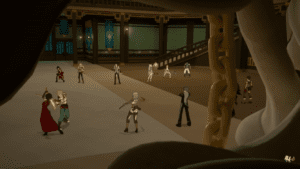After my last review, I may have left the impression that I wanted to burn the middle section of RWBY Volume 5 (episodes 5-10) to the ground in a nerdy rage, which isn’t entirely accurate. While the pacing issues of these episodes did severely hamper my enjoyment of them, this part of the volume did deliver some solid moments of character development for team RWBY. So without further ado, let’s dive into what I actually liked about RWBY Volume 5 episodes 5-10.
Character
One thing that really sticks out about Volume 5 is the concerted effort by the writers to give each of the four heroines (Ruby, Weiss, Blake, and Yang) their moment in the spotlight. This has been something the series has consistently struggled with in prior volumes, often only focusing on two of the four, usually Weiss and Blake. Fortunately, V5 did not follow this pattern, and the audience got to see all four explored in one way or another.
To be clear, I am fully aware that only pulling this off halfway through Volume 5 is pretty weak in terms of writing. While RWBY has always been more plot-driven than character-driven, this is the sort of thing that a show should be accomplishing in its first or second season, not its fifth.
However, I don’t want to discount that this is a massive step forward for the series, especially since writers Miles Luna and Kerry Shawcross do sincerely care about improving their skills. While the two still have a lot of work to do, they’re taking all the right steps; admitting they’re not perfect, identifying where they need to improve, and getting feedback from other creators. As frustrating as some of their writing choices regarding the characters are, I can’t ignore the progress they’re making. And if there’s one example of this progress, it’s Ruby herself.
Ruby
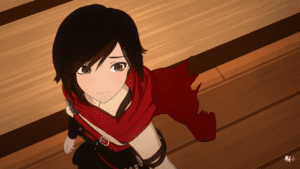
I have a lot of issues with RWBY, but perhaps the most pressing is Ruby Rose herself. Since Volume 1, Ruby has consistently failed to fulfill the basic functions of a protagonist – the plot is rarely (if ever) driven by her actions, we don’t really have a sense of her goals for the future, and her character development has been pretty minimal, all things considered.
I could go into a lot more detail, but given that this is a review of Volume 5, I’ll leave my issues with Ruby in the first four volumes for another article. Needless to say, Ruby has been a frustrating protagonist for the series – which made her storyline in V5 a breath of fresh air.
Particularly in chapters five and ten, there was a much stronger focus on how the events of the previous volumes have shaped Ruby, and how she feels towards the series’ antagonists.
Chapter 5 (Necessary Sacrifice) is noteworthy for being perhaps the first time in the series we really get to see how Ruby feels about what’s happened to her. Again, the fact that we’re only getting this halfway through Volume 5 is…troubling, to say the least. However, I’m not going to discount the writers for making an effort to fix the series’ issues, especially given that they’ve openly acknowledged that this is an area they need to improve on.
The scene in question is the conversation between Ruby and Oscar. Now I LOVED this scene. It’s an incredibly emotional and tender moment between these two characters and gives us a real insight into how the events of the last four volumes have shaped them as people. It’s easy to forget that at the end of the day, Ruby and our other heroes are soldiers. She might be the dictionary definition of upbeat, but that doesn’t change the fact that she fights monsters for a living. That’s going to take a toll on anyone, especially a teenager with only a few years of combat experience.
This is all the more obvious in Oscar, who has zero training and is quite scared of the situation he’s been thrust into. And who can blame him? While I’m sure many of us have wished we suddenly had superpowers and could fight monsters, being suddenly thrust into a war with no experience or emotional preparation is going to have consequences. As eccentric as our heroes may be, it would be reasonable to assume their combat training would have included processing battlefield experiences – training which Oscar has none of, so it’s not hard to see why he freaks out a little.
It’s Ruby’s reassurances to Oscar that really let the scene shine, though. After unintentionally repeating Penny’s catchphrase of ‘combat ready’, the audience gets to see just how much our happy-go-lucky protagonist is grieving. The terrific voice acting by Lindsay Jones coupled with the excellent animation of Ruby’s face really sell this, but what ties it all together is the instrumental version of ‘Let’s Just Live.’ The somber piano notes pull on the heartstrings, especially when they play the instrumental version of this part of the song;
And the story
Takes an unexpected turn
A friend is suddenly gone
We can cry our lives away
But if they were here they’d say
Go forward you must keep moving on
‘Let’s Just Live’ is a song about recovering from loss. For the characters, it’s about their traumas from the Fall of Beacon, which makes it perfect for a scene where Ruby shares her grief over the friends she lost that night. On top of that, the song clearly incorporates the grief CRWBY feel over the loss of series creator Monty Oum, which his catchphrase and his very name being incorporated into the lyrics [2]. The fact that Ruby says Oum’s catchphrase, ‘Keep moving forward’ while this song is playing makes the scene even more impactful.
In addition to exploring Ruby’s grief, the scene touches on Ruby’s fears. Her point on why she’s afraid of Salem is a great moment of character exploration as well as subverting the usual reasons the hero is afraid of the Big Bad. Ruby isn’t scared of Salem because she’s trying to destroy the world – she’s scared because Salem doesn’t care about who gets hurt in the process. It’s not often we get to see villains whose scariest aspect is their apathy. Anger, power, sadism – those are explored in antagonists all the time, but apathy rarely gets that level of attention. As terrifying as malicious intent can be, sometimes the complete and utter lack of caring for other people can be just as, if not even more terrifying, which makes the story all the more interesting.
Overall, the writing behind Ruby Rose was much, much better in this part of the volume. While Luna and Shawcross still have a way to go, it’s clear that their efforts to fix the series’ issues with Ruby are starting to pay off.
Weiss
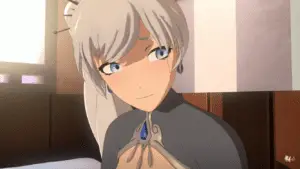
Now Weiss was an absolute delight in this part of the volume. After spending the first four episodes either locked up or battling Grimm, episodes five through ten took the time to explore her character and how she’s grown over the course of the series, which can be summarised within three words:
WEISS. HUGS. EVERYONE.
In all seriousness, Weiss’ newfound warmth towards her friends was one of the highlights of V5. If that hug at the end of chapter four wasn’t wholesome enough, Weiss spent a good chunk of chapters five through ten being incredibly kind and supportive towards her comrades, especially Yang. This is quite noteworthy as Weiss Schnee is literally the poster girl for the Ice Queen trope, at least in volume one. Arrogant, cold, irritable – all these qualities aptly described V1 Weiss. As the series has progressed though, she has ‘thawed out’ quite significantly, and V5 showcased this. She initiates hugs with her friends, makes them the coffee they like, and offers them support when they need it.
While these wholesome Weiss moments were scattered through the middle part of volume five, episode eight, ‘Alone Together’, was the clear standout. Watching Weiss comfort Yang and empathise with her conflicted feelings over Blake was a quadruple whammy of good writing – it was tender and emotional, it showcased Weiss’ growth, gave us more details about her past, and developed the relationship between two characters who haven’t had much screen time together. To top it all of, it’s scored to the instrumental of ‘The Path to Isolation’ – fitting for a scene about two characters discussing their experiences with loneliness. But given how relevant that is to Yang’s arc, I’ll save the trouble of repeating myself and get back to that later. For now…
Blake
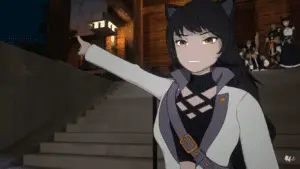
Blake’s arc stood out from the other members of team RWBY in that it felt more like the sequel to her arc from volume four, rather than self-contained within one volume. I get that that’s how character development works – it’s an overarching journey throughout the course of a series – but because how lacklustre her storyline was in volume four, her arc this volume felt almost like the missing piece to making her V4 plotline work. It almost made her arc feel like a season of Agents of S.H.I.E.L.D., with things left hanging after the mid-season finale and the characters’ journeys not being truly resolved until the end of the season.
This choice of story structure, coupled with the abysmal pacing of episodes five through ten, made Blake’s development feel a lot less earned than the other characters. Which is a real shame, because out of the main four, I feel like Blake has done the most emotional work on screen, particularly through her friendship with Sun. Their chat in episode five reflected she was taking on board Sun’s advice not to push her friends away and use that to help Ilia…which, in turn, makes her quest to save Ilia feel like a natural step forward in her character arc.
But because she got said advice in volume four chapter eleven and doesn’t use it in her interactions with Ilia up until chapters eight and ten of volume five, her growth just doesn’t have the same impact. I get that the show has to juggle multiple storylines, and that character development happens over a period of time rather than in rapid succession, but in this case, it was stretched too far. Blake’s speech to the people of Menagerie was a nice moment of growth, but the poorly structured plot leading to it meant it had a lot less emotional impact than it could have.
Yang
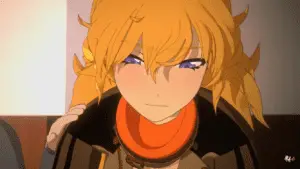
Yang once again stole the show in the middle section of V5, giving us some of the best moments for her character in the whole series. Much like Weiss, she was great throughout all her scenes, but two in, in particular, stood out. The first, of course, is the conversation between her and her mother.
To say that these two have a complicated relationship might be sugar-coating it. Throughout the entire scene, Yang’s bitterness towards her mother is very clear. It’s a stark contrast to the normally playful Yang from earlier volumes. Not that Yang is gone, but there’s definitely a more questioning, a more suspicious side to her now, and it really begins to show during this scene. It’s fascinating to watch as Raven tries to bring Yang to her side, casting doubt on the people she loves and respects.
Not only is this a fresh direction for Yang, but it’s also a very relatable one. One of the hardest parts about growing up is finding out that the world can be a dark and ugly place, and that the people you look up aren’t always what they seem. And while we may not have beloved uncles who infiltrated combat schools to learn how to kill Huntsmen and Huntresses, I’m sure we’ve all had that awful moment when you discover someone you admire has a nastier aspect to them. This new side of Yang finds it way into the other major scene for her in this part of the volume; her conversation with Weiss about Blake.
Yang’s feelings towards Blake have drastically changed since the Fall of Beacon. While they don’t reunite until the finale, there’s clearly a lot of frustration on Yang’s part – again, a very relatable emotion given what she’s been through. It’s hard not to want to reach through the screen and give her a hug, especially when she delves into her abandonment issues, and how Blake’s departure has reopened old wounds. It’s a reminder that even the most popular individuals can be plagued by insecurity and loneliness, despite appearances.
Yang herself falls into this trap, being completely oblivious to Weiss’ different yet similar insecurities, which Weiss uses to help Yang see Blake’s perspective. Because in the end, she’s right – Weiss, Blake and Yang all know loneliness in their own way, but that doesn’t mean they can’t understand one another. And while ultimately this conversation doesn’t resolve all of Yang’s feelings towards Blake, it’s a step forward. It’s a sad scene, but it’s also a hopeful one that opens a lot of doors for what’s coming next…
